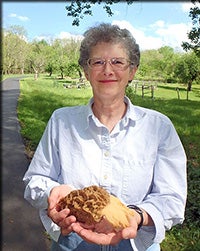SUNY professor to discuss secrets of fishes
State University of New York professor Dr. Karin E. Limburg will discuss the secrets of fishes at 4 p.m. March 26 in Room C-209 of East Carolina University’s Science and Technology Building.
The event is free and open to the public. A light reception will follow.
Her presentation, “The ‘Other’ Biogeochemistry: Otoliths and their use to Reconstruct the Lives of Fishes” will feature an introduction to the otolith, a bone in a fish’s auditory system.
“Fisheries science was revolutionized decades ago by the discovery of fine scale chronometric properties of otoliths (literally, ear-stones),” Limburg said. The small structures, which form part of hearing and balance systems in fishes, provide a permanent record of the age and growth history of each fish, she added.
“Today, a second revolution is occurring in otolith science, as the chemical properties of otoliths are becoming better understood and quantified,” Limburg said.
Limburg is professor in the Department of Environmental and Forest Biology at the State University of New York’s College of Environmental Science and Forestry. She holds a Ph.D. degree from Cornell University, a master’s degree from the University of Florida and dual bachelor’s degrees in biology and ecology/conservation from Vassar College.
She has served as guest scholar at Stockholm University, developing simple ecological/economic models of fisheries. And she held a postdoctoral position at the Institute for Ecosystem Studies (now the Cary Institute), studying interactions of larval fishes and their zooplankton prey. She was a Laura Randall Schweppe visiting lecturer at the University of Texas Marine Lab in 2011.
Limburg has received a National Science Foundation CAREER award for promising scientists early in their career and the 2010 SUNY-ESF Exemplary Researcher of the Year award. She has served as a president of the U.S. Society for Ecological Economics and is president-elect of the Estuarine Section of the American Fisheries Society. She is co-chair of the Continental Margins Working Group, an international scientific collaboration.
The lecture is sponsored by Dr. Roger Rulifson, Thomas Harriot College of Arts and Sciences Distinguished Professor.
For additional information, contact Rulifson at 252-328-9400 or rulifsonr@ecu.edu.
Individuals requesting accommodations under the Americans with Disabilities Act (ADA) should call 252-737-1016 (voice/TTY) at least 48 hours prior to the events.
###
